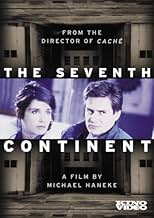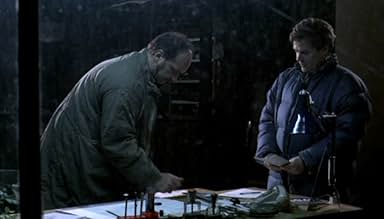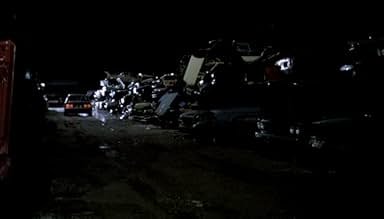Una famiglia europea che ha intenzione di scappare in Australia, sembra intrappolata nella sua routine quotidiana, turbata solo da piccoli incidenti. Tuttavia, dietro la loro calma stanno ef... Leggi tuttoUna famiglia europea che ha intenzione di scappare in Australia, sembra intrappolata nella sua routine quotidiana, turbata solo da piccoli incidenti. Tuttavia, dietro la loro calma stanno effettivamente progettando qualcosa di sinistro.Una famiglia europea che ha intenzione di scappare in Australia, sembra intrappolata nella sua routine quotidiana, turbata solo da piccoli incidenti. Tuttavia, dietro la loro calma stanno effettivamente progettando qualcosa di sinistro.
- Premi
- 2 vittorie e 1 candidatura in totale
- Self
- (filmato d'archivio)
- (non citato nei titoli originali)
Recensioni in evidenza
The long takes Haneke favors throughout The Seventh Continent, introduce the audience to a young family living in Europe that live in precisely the way that is expected of them. Georg Schober (Dieter Berner) works diligently at his career, always placing himself in the best possible position to advance through promotions and better situate himself in his profession. Anna Schober (Birgit Doll), an optometrist, steadfastly maintains her family's home, dutifully completing all the tasks and errands to keep the everyday lives of her family running. Anna is also reacting to the death of a parent, which has devastated her brother, assuming the role of the strong focused sibling taxed with the burden of maintaining her parents' business. The youngest member of the family, Evi, fills her time coloring pictures, doing her homework, and occasionally causing mischief at school by feigning blindness. Neither Georg's career advancements, Anna's mourning, nor Evi's misbehavior is consequential to the story--they are simply moments that happen in each of their lives and fills their days. This is precisely Haneke's point; most of what we do in our lives are mundane activities which fill our time until we die. Whether it be a scene filmed in real time at a car wash or listening to someone relay a story during an eye exam, Haneke gives us these moments in as similar a way as they actually occur, removing all sense of grandiose filmmaking, forcing the audience to see themselves in the lives of those depicted on screen. It's hypnotizing they way we can scoff at collective suicide, yet through watching the events that lead up to the act come to understand the universality of the expectations we adhere to. Every move is repetitive, the same food is served every day at breakfast, the same pommel horse is jumped over in gym class, the same filling station is visited when the car is low on fuel. We often live our lives thinking of the future, fooling ourselves into believing that the monotony we serve daily is crucial to our growth until we are shocked to learn that the future we have been striving towards has become the past. We get so lost in the day-to-day that we need Haneke to make clear that the way we actually live our lives doesn't make all that much sense once analyzed.
The cold emotionless state maintained in the Schober home is sobering to watch. No amount of intimacy brings the family closer together. Even after making love, Georg and Anna immediately return to the distance between each other that fills their days. Not only does one hardly see any affection between the members of the Schober family, but we also rarely see them enjoy conversations with each other. The cold, detached atmosphere isn't confined to their home, either. Each time they exchange currency for a service, the audience is afforded a glimpse into the lives of everyone they interact with, each doing their job or performing a service while all vitality seems to have been drained from their being. Through the entire runtime of The Seventh Continent, we don't see a single meaningful human connection. There is even a scene in which a man recently released from his employment with Georg, returns for his things and isn't given a single embrace of encouragement or a kind word. His appearance disrupts the work because he is unexpected, further cementing Haneke's notion that our lives are simply made up of a series of repeated actions, and we are stricken by the break from routine when interrupted. Despite the lack of compassionate connectivity, I would argue that Haneke's feature is one of the most humanistic films I have recently seen, because it gives hope to our existence and alerts us to think critically about our society.
The Schobers, husband George (Dieter Berner), wife Anna (Birgit Doll), and daughter Eva (Leni Tanzer), are the happily married family living next door. George is an engineer and Anna an optician. Eva is a bright child of about eight with deep, expressive eyes. The family moves through their morning ritual with precision -- brushing their teeth, feeding the fish, and eating breakfast with little conversation or emotional interaction. The camera avoids their faces, focusing on mundane objects such as a bowl of cereal, an alarm clock, a fish tank, a package of congealed broccoli. This preoccupation with objects underscores the lack of connection between the characters and the things they have acquired. We get our first hint that something is not right when Eva pretends to her teacher that she has lost her eyesight. Anna questions her about the incident, promising not to harm her if she tells the truth but, when Eva admits to the lie, suddenly slaps her across the face ignoring the fact that she is a very troubled little girl. It is from here that the cracks begin to widen.
Depicting ritualistic actions like counting of money at a supermarket, the distractions of television, the meaninglessness of work, the film reflects the powerlessness and isolation of people in modern society. Haneke chronicles a family enslaved to the structures they have created, operating in a morass of emotional vacuity. The first hour may seem slow but it builds considerable tension until it reaches a shattering climax. Little by little the family disengages. George quits his job and writes letters to his parents hinting of something dark about to happen. In the absence of a spiritual core, without the possibility of meaningful action, the family sinks deeper into an abyss, unraveling and discarding the tightly woven structures of their life. Similar in theme to Todd Haynes' 1995 film Safe but with three times the power, The Seventh Continent is a ruthlessly intelligent film that burns its way into your psyche, leaving an indelible mark that will forever haunt your dreams.
The Seventh Continent was the second Michael Haneke film I had seen after The Piano Teacher. While I do not think that it is as honest a film as The Piano Teacher, I do applaud the fearless dynamic of the film to be completely devoid of style and of typical film conventions in order to depict a world that grows increasingly unpredictable and harrowing. The film is very Hitchcock-like in how it slowly and quietly builds it's themes involving desolate emotions. It is a tremendously scary film, but it is scary in a way that comes off a lot stronger after the film has finished and you allow it's images to swim around in your head for a while. The loss of passion and of feeling in a human being, to my knowledge, has never been depicted in such a pessimistic way.
This is a very angry film. This is a very resentful film. This is a film that celebrates sadness and anger and I hated watching it. When the film finds time to depict humanity, it writes it off like it is useless. What makes me even more angry about the film, in a way, is how you can almost feel Haneke behind the camera feeling resentful and wanting to punish the audience for wanting to view a film with a good story and a moving and engaging plot. Haneke goes so far out of his way to provide nothing in the way of narrative power and instead opts to craft an angry and traumatizing film. What makes the film work is it's power to provide some deeply haunting imagery and some truly worthwhile substance that I couldn't help but appreciate. Two of these three characters have complete control over everything that happens and they obviously feel that what they do in the final act of the film is most beneficial. Who am I to judge their own control over their lives. What pisses me off is how simple minded they are as characters. I just feel that Haneke prefers to emphasize these problems that these characters share, and what I am bothered by was that he didn't make it less obvious.
Overall, it's not one of Haneke's best films, but for a debut theatrical picture it is about as good as one can get. What strikes me as rather unusual about this film, when compared to his other films, is how it suffers from the same major problems that pretty much all of his films have. For example, he has never been able to build any sympathy with any of his characters, at least from the films of his that I've seen, and this film is no different in that regard. The film of his that I personally think suffers the most from it is Funny Games (both versions). With his picture Cache, it only became a problem early on in the film, and in Benny's Video and Hour of the Wolf it helped add to the atmosphere while damaging the humanity of the films in question. I think that The Seventh Continent shows plenty of promise with Haneke and is extremely riveting at times, but it's easily the absolute worst place to start if you are interested in getting into his films. It will not leave you with a good impression of his work, and only after watching Funny Games and Cache (his most easily accessible films in my opinion) will you be able to catch his reoccurring themes.
This is not a pleasant movie to watch. It's sad, bleak, disturbing and angry; and Haneke doesn't make it easier to the viewers. He presents life as it is, without any dramatization; and what it strikes me the most is the pace in which he presents it. The characters doesn't shout (they speak every once in a while), fight or cry their hearts out; they just keep on doing the same things they do every day. However, as you watch closer, you sense that something is completely wrong.
To me this is as an existential film as you can get. The world is there: raw, unsympathetic and indifferent. Everything happens without a reason, without hope; and the character's lack of desire to confront the nothingness of an empty life is the central theme of this movie.
"What happens when people are dead from the inside?" That's what I asked myself after watching this cold, cynical, gem of a movie. Can be someone dead from the inside and alive from the outside?. If so, could that person communicate with any other person? How can we avoid the meaningless things in life? Should we fight them back or surrender to them? Watch this movie and then you may find the answers to those questions..... or may be not. HIGHLY RECOMMENDED!. Avoid watching it if you're a bit depressed. This movie is bleak and challenging as hell.
Lo sapevi?
- QuizBased on real events.
- Citazioni
Georg Schober: We have to cancel the newspaper subscription
Anna Schober: Mhm
- ConnessioniFeatured in Selección TCM: Michael Haneke (2012)
- Colonne sonoreSend Me Roses
(uncredited)
Written by Günter Mokesch and Karin Raab
Performed by Günter Mokesch and Karin Raab
I più visti
- How long is The Seventh Continent?Powered by Alexa
Dettagli
Botteghino
- Lordo in tutto il mondo
- 428 USD














